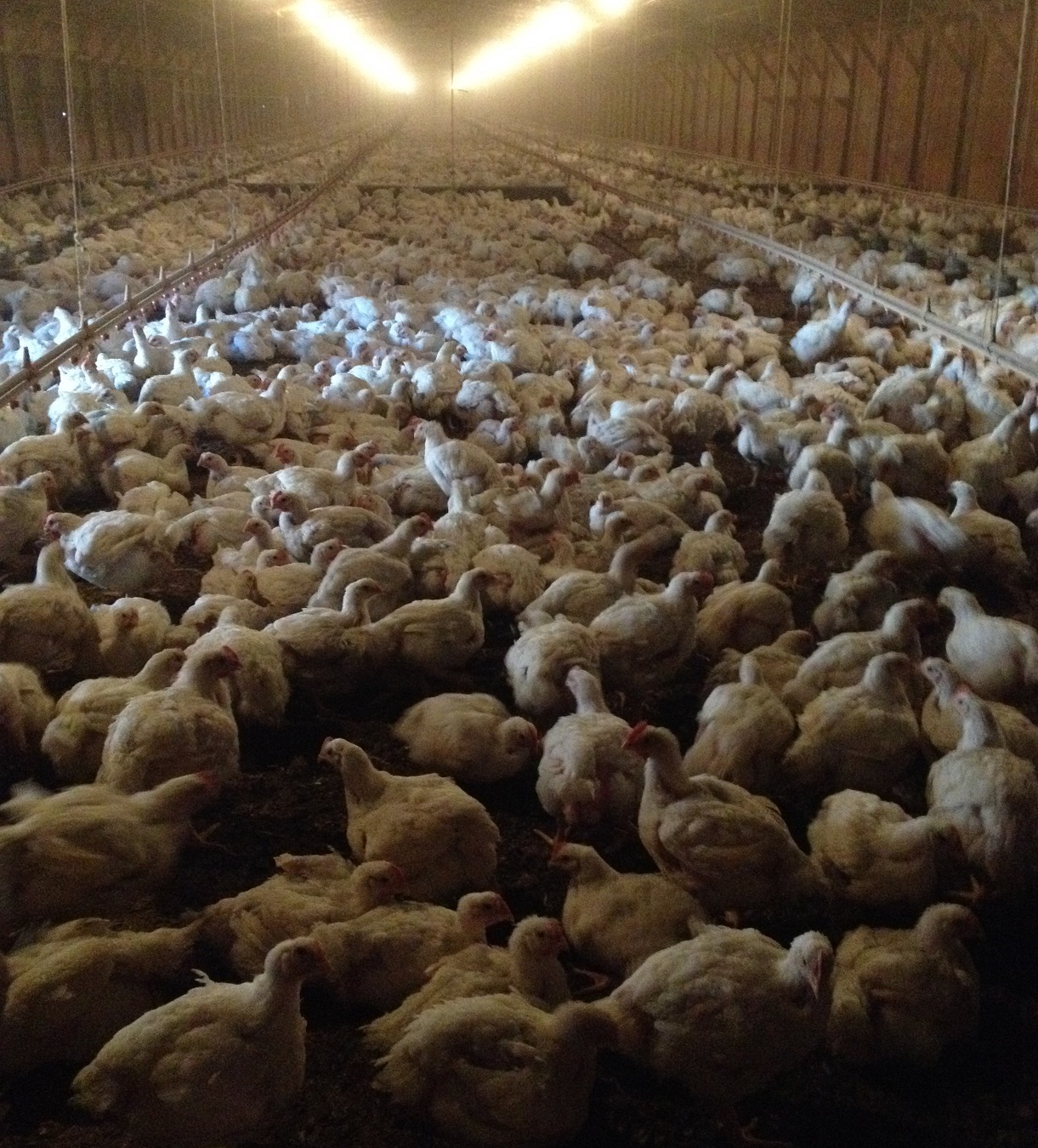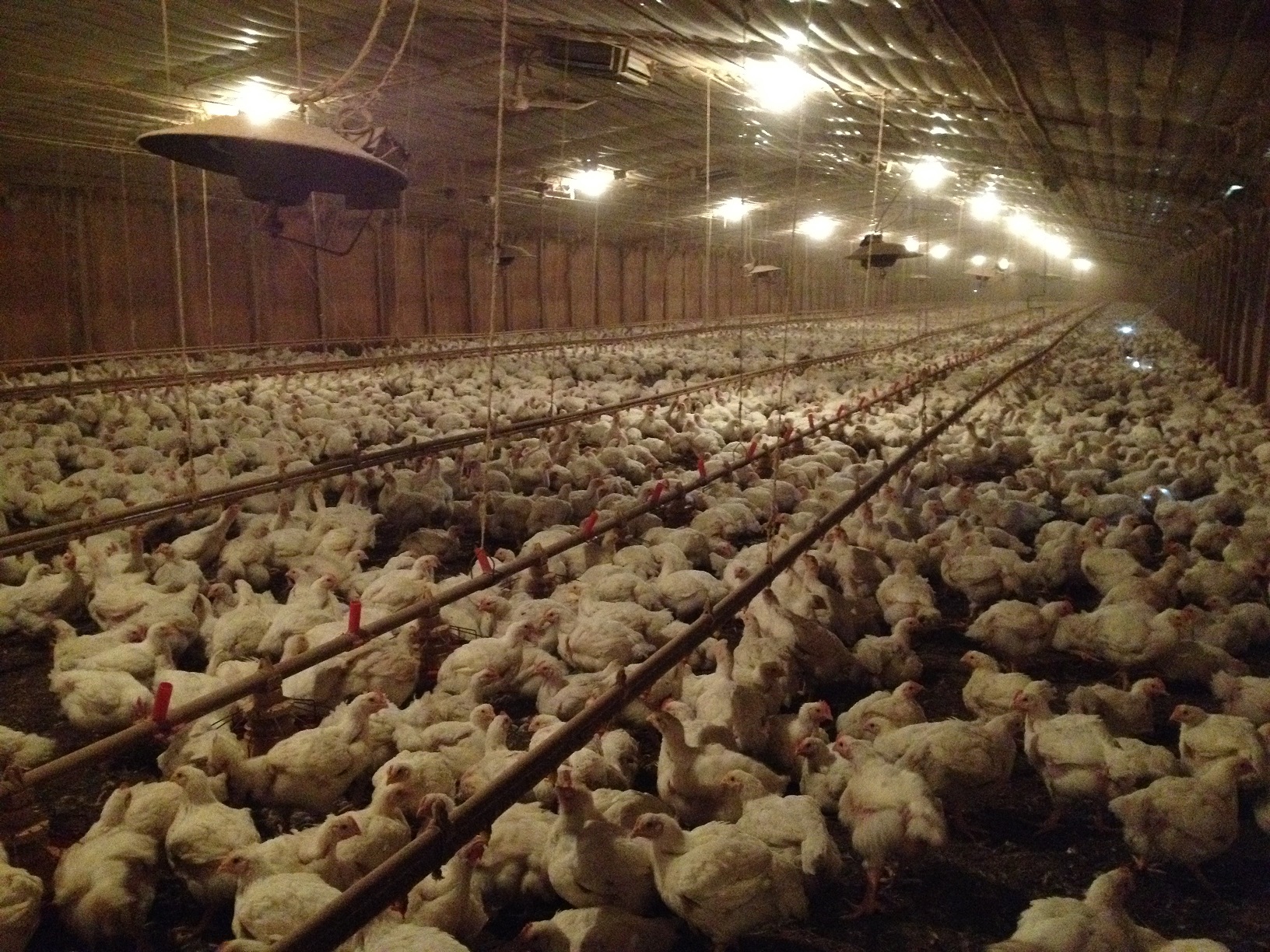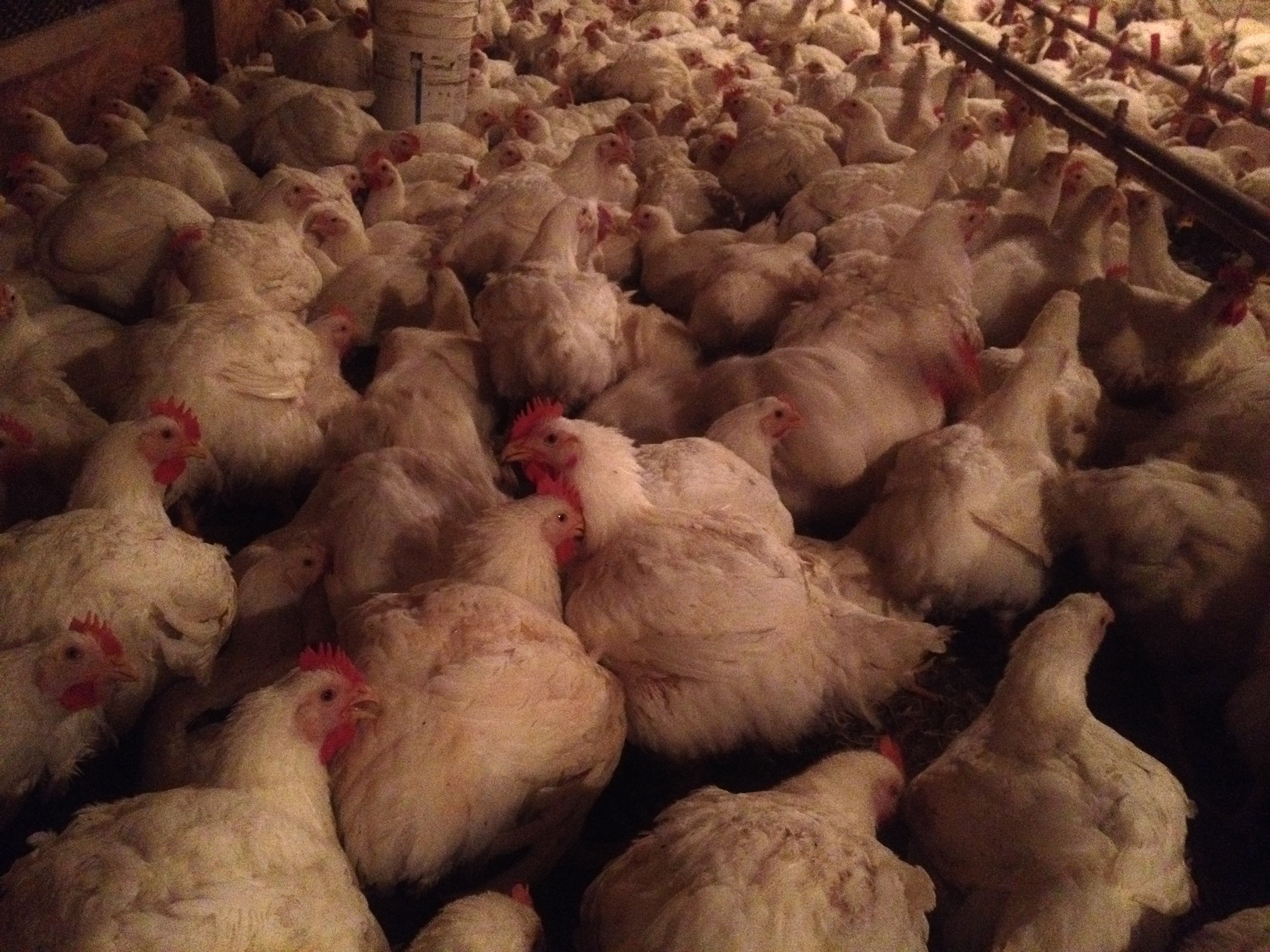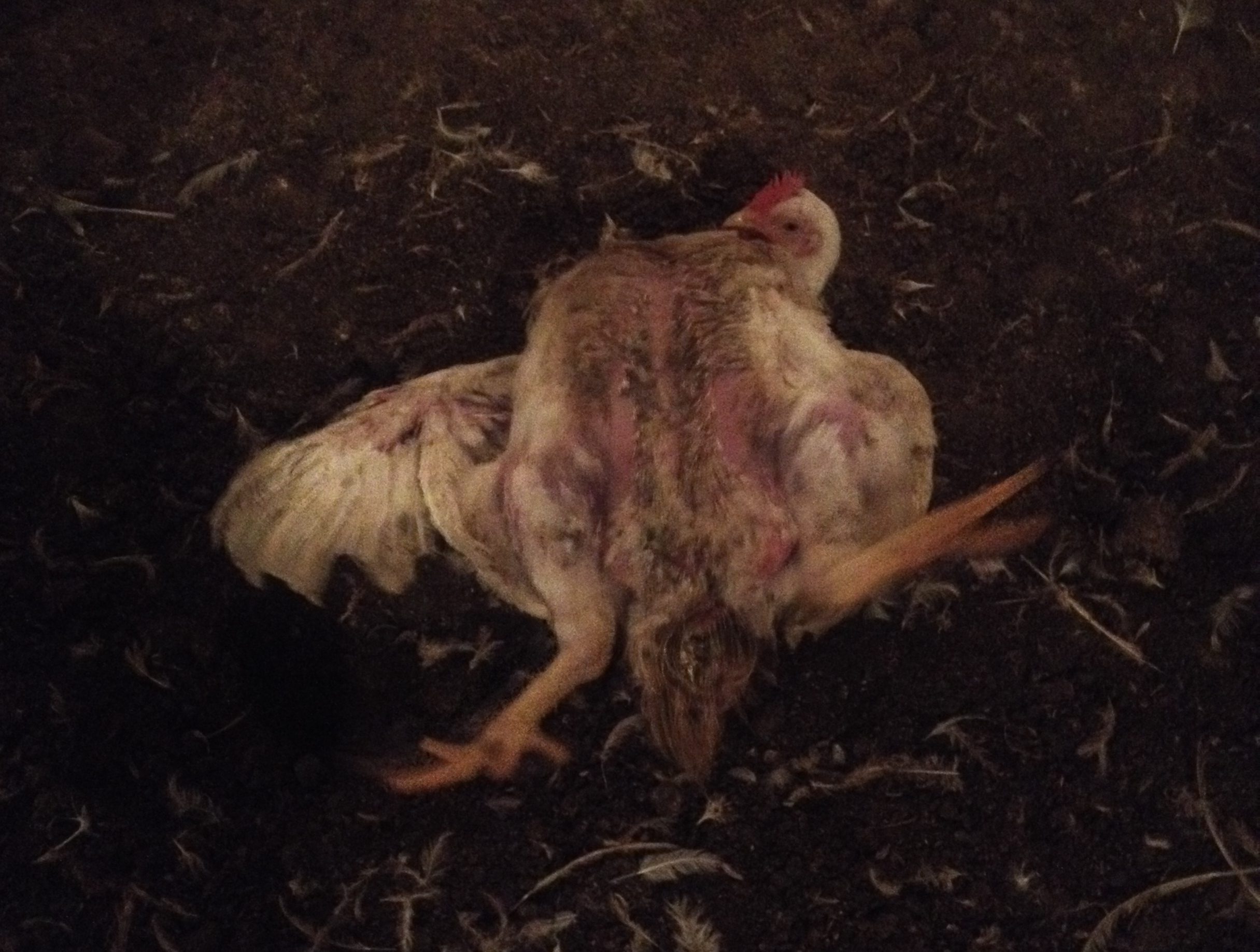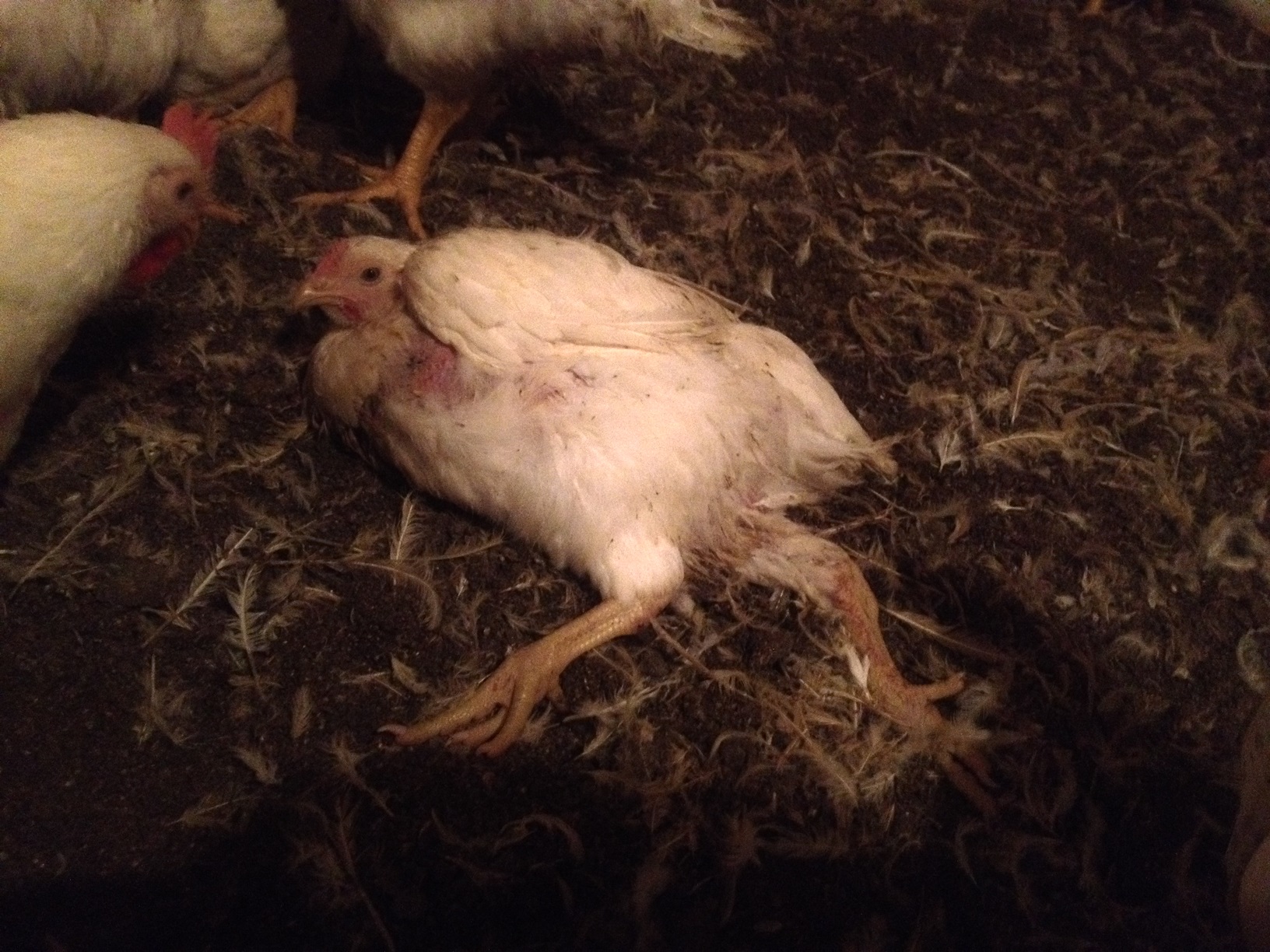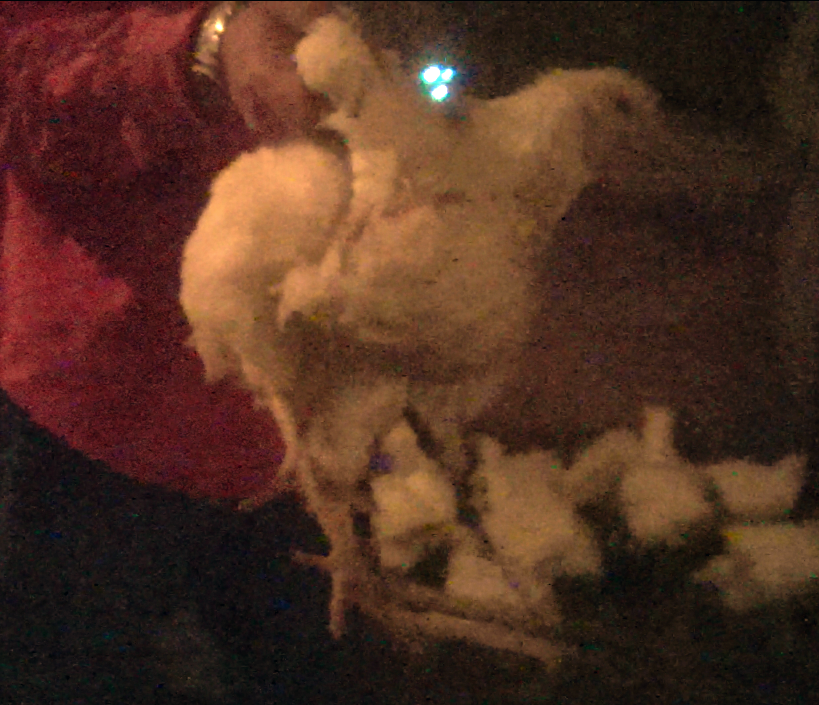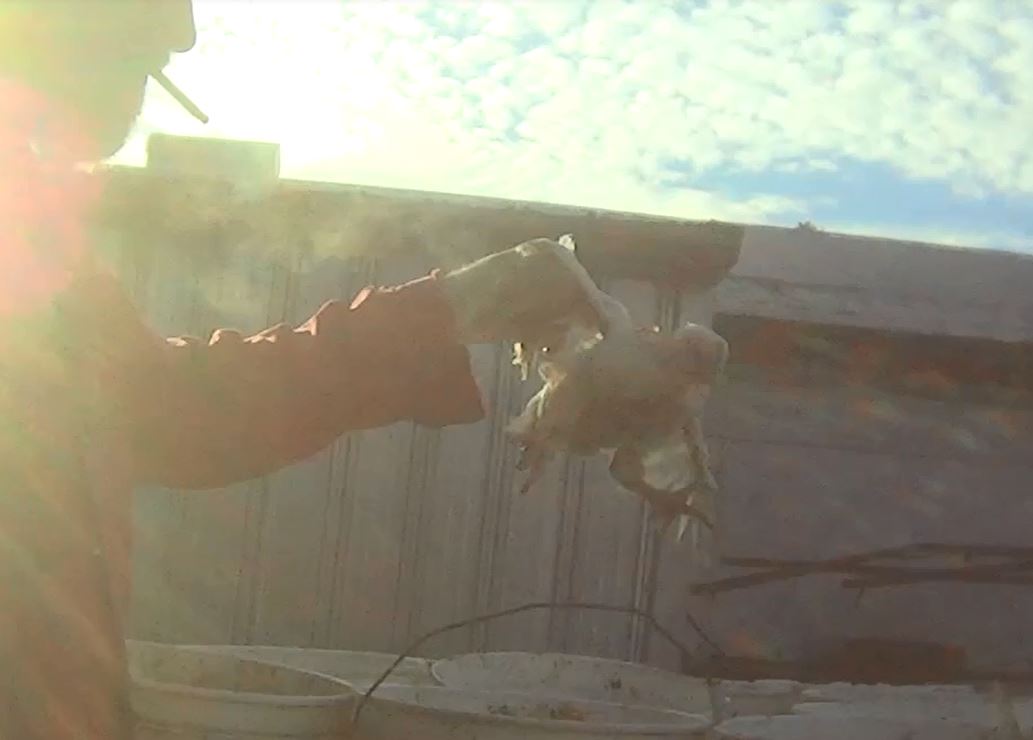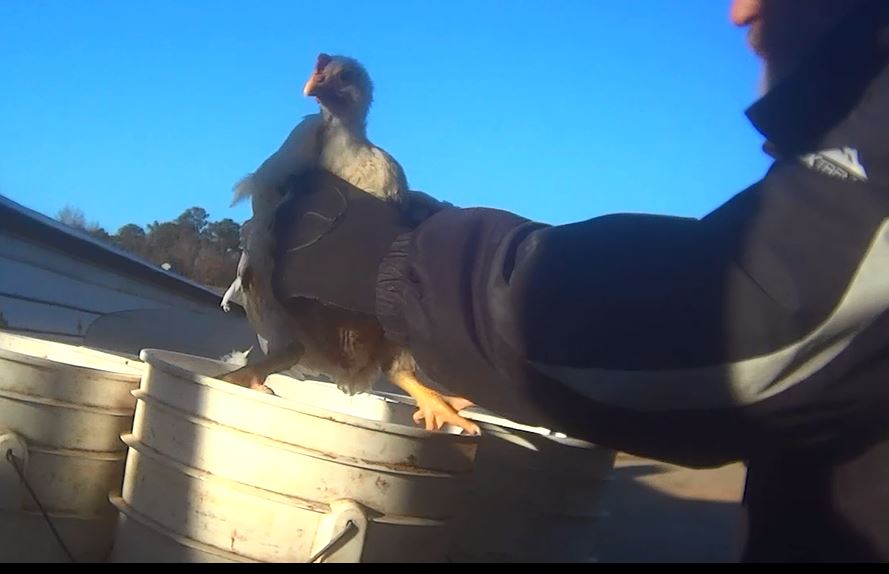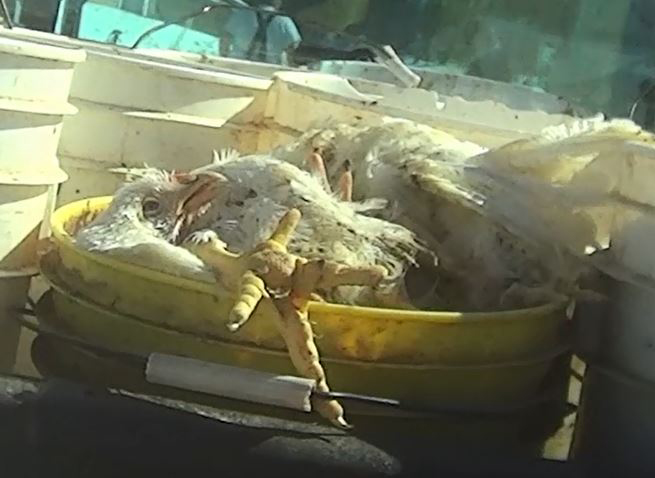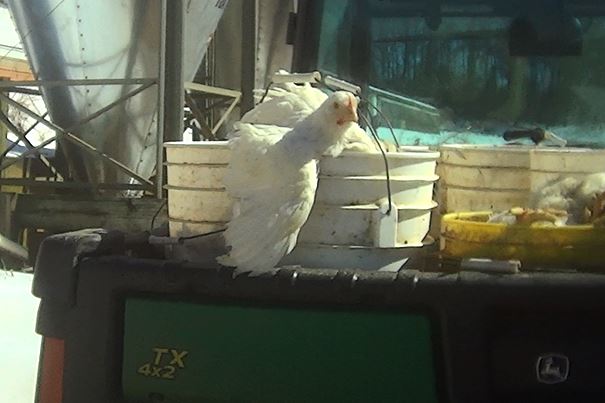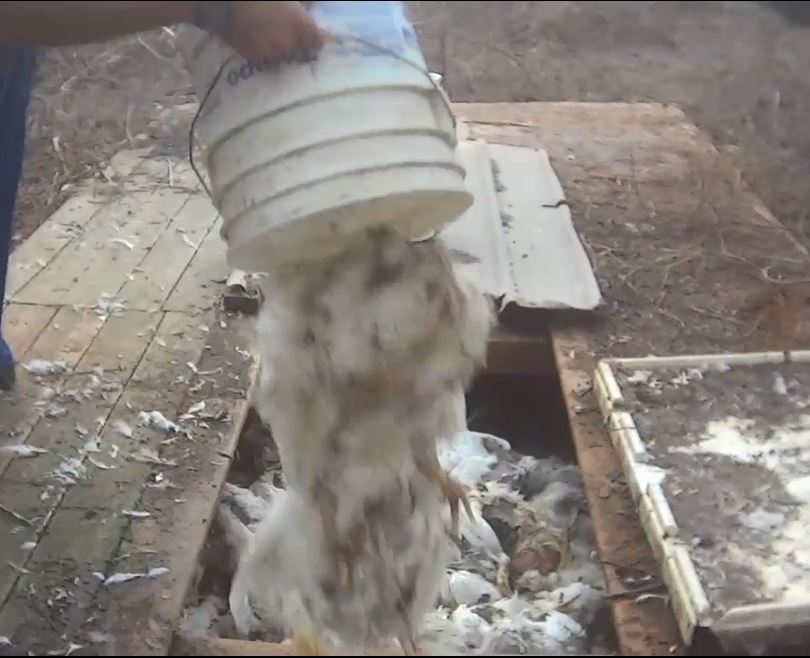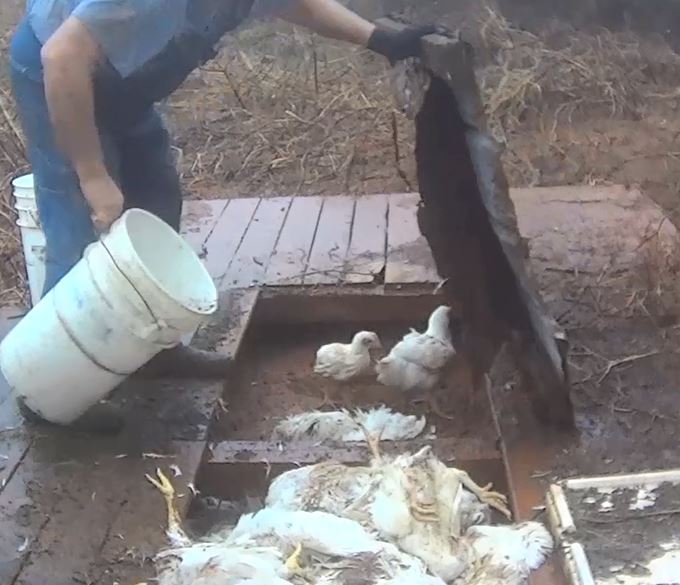- Like
- Digg
- Tumblr
- VKontakte
- Buffer
- Love This
- Odnoklassniki
- Meneame
- Blogger
- Amazon
- Yahoo Mail
- Gmail
- AOL
- Newsvine
- HackerNews
- Evernote
- MySpace
- Mail.ru
- Viadeo
- Line
- Comments
- SMS
- Viber
- Telegram
- Subscribe
- Facebook Messenger
- Kakao
- LiveJournal
- Yammer
- Edgar
- Fintel
- Mix
- Instapaper
- Copy Link
Pilgrim’s Shame: Chickens Buried Alive
Video | Photos | Chicken Industry | Laws & Experts | Press | Act Now | Donate
Each year in the U.S., more than eight billion chickens are raised and killed for their meat, and countless more suffer and die before even reaching the slaughterhouse. Few people have seen the daily miseries these baby birds are forced to endure — until now.
Typically kept hidden from public view, our video footage uncovers the following day-to-day horrors:
- Birds suffering from painful leg deformities, unable to walk
- Sick or injured birds thrown around
- Unwanted birds stuffed into buckets with dead or decaying corpses
- Live birds dumped like trash into outdoor pits, left to die from starvation, dehydration or possibly even suffocation
Shockingly, much of the suffering these birds endure results from standard industry practices. However, we believe that several acts of abuse we documented, including dumping birds alive, not only fall outside of accepted industry practices, they also violate state animal protections laws. Our evidence has been turned over to local authorities for further investigation. (Read more details.)
“The undercover video shows startling images of birds being mistreated. The actions in the video are unacceptable. Pilgrim’s has initiated an investigation, led by our Animal Welfare Steering Committee and suspended our relationship with the grower.”
JBS USA
Pilgrim’s parent company
Pilgrim’s Investigation Photos
Pilgrim’s Shame: Behind Closed Doors
On the same day they hatch, these chickens, referred to as “broilers” by the industry, arrive at the grow-out facility where they’ll spend the next few weeks of their short lives.
At Prince Poultry, the facility where our investigator worked, there are 12 massive warehouse-like sheds where birds are raised and crowded inside. Each shed contains more than 20,000 birds living in dark, filthy conditions. In total, this one facility will raise approximately one million birds in a single year.
As is standard industry practice, these birds are selectively bred to rapidly grow from tiny hatchlings into obese, adult-sized chickens in a matter of a few weeks. This abnormally fast growth commonly causes birds to collapse under their own weight. They suffer from painful and debilitating leg deformities that make it nearly impossible for them to access food or water. Other birds may suffer from sudden heart attacks, which the industry casually calls “flip-over disease.” (Read more about the suffering caused by fast growth.)
Unable to escape their own nauseating waste, virtually all of these birds endure severe ammonia burns on their chests.
To make matters worse, some birds at this facility also experienced outright abuse at the hands of workers. Unwanted birds — those that are deemed sick, injured, too small or otherwise unprofitable — are routinely “culled,” and our investigator documented workers throwing some of these live birds across the sheds. They also used metal hooks to pick up the birds by their necks and stuff them into the same buckets as the dead and decaying corpses of other birds.
Treated as trash, these birds are then dumped alive into outdoor pits and left to die from starvation, dehydration or possibly even suffocation. When our investigator asked if these birds who were very much alive would be killed before being dumped, a worker acknowledged they’re supposed to kill them first but they don’t.
Please watch and share this video exposing the miseries behind the chicken industry.
Please also view our photo gallery which includes images from a second North Carolina facility that also supplies Pilgrim’s — these images reveal the suffering endured by hatchlings who are just starting out their short lives inside a factory farm.
Facts about Chickens & The Chicken Industry
Did you know?
- Each year in the U.S., more than nine billion birds, pigs and cows are raised and killed for food. About 8.5 billion, or close to 95 percent, of these animals are chickens.
- In 1925, it took 16 weeks for a chicken to grow up to 2.5 pounds. Today, chickens are selectively bred to grow to more than twice that size in just six weeks.
- If you grew at the same rate as a factory farmed chicken, you’d weigh 660 pounds by the time you turned two months old.
- Studies suggest that almost a third of factory farmed chickens suffer from leg deformities so severe that they actually have trouble walking.
- One farmer summed up the extent to which we have manipulated chickens by saying, “We have successfully bred most of the chicken out of the chicken.”
- Factory-farmed chickens live in their own waste for their entire lives, which can, and frequently does, result in ammonia burns, respiratory issues and eye irritations.
- Shockingly, there are zero federal regulations that protect chickens, from the moment they hatch to the moment they’re slaughtered.
- Scientists have learned that, like some other animals including pigs, chickens are smarter than four-year-old children when it comes to skills involving math, self control and logic.
- Also, scientists confirm that chickens have communications skills on par with primates, use sophisticated signals to convey intentions, can solve complex problems, can express empathy, and can be deceptive and cunning.
- Many plant-based meats, which are made entirely from plants, taste identical to chicken. In fact, New York Times food writer and author Mark Bittman said Beyond Meat’s chicken-free strips “fooled me badly in a blind tasting.”
State & Federal Laws to Protect Chickens
To most people’s surprise, there are no federal laws to protect chickens raised for food.
Unfortunately, from the moment they’re hatched until they are slaughtered, the routine abuses these smart and social animals often endure are beyond the reach of the law. Although chickens represent more than 90 percent of the animals raised and killed for food each year in the U.S., they are explicitly exempted from the Humane Methods of Slaughter Act.
At the state level in North Carolina, the anti-cruelty code fails to offer adequate protections to prevent many of the cruelties seen in our undercover investigations. In fact, practices that are considered standard within the industry are protected under state law. However, some of the acts of abuse we caught on camera at Prince Poultry — including throwing and beating chickens with metal rods, stuffing live birds into buckets with dead birds, and routinely dumping live birds into an open pit to languish and die — fall outside of industry norms, and therefore should be considered felony violations of cruelty to animals.
Expert Statements
“Dumping sick and injured live birds to die in the cold will result in a huge amount of suffering, is completely inhumane and does not conform to industry practices.” – Dr. Ian Duncan, internationally renowned poultry expert and professor at the University of Guelph.
“Several birds are still alive when they are put onto the dead pile …. Acclimated to the thermal environment of the grow-out house, and genetically predisposed to eat often, these birds would die slowly from cold temperatures, starvation and dehydration, or due to their injuries or illnesses. This treatment of the birds is neglectful, and is wholly unacceptable.” – Dr. Sara Shields, Ph.D., renowned chicken behavior and animal welfare expert and member of the Animal Welfare Committee for Safeway stores.
Press
Act Now
- Chicken Abuse Uncovered at North Carolina Factory Farm, HLN, July 10, 2014
- Greeley-based processor halts use of chickens from N.C. farm over cruelty allegations
Greeley Tribune, July 9, 2014 - Pilgrim's Pride investigating alleged chicken abuse
Northern Colorado Business Report, June 30, 2014 - Undercover videos that reveal illegal activity at farms could be outlawed
Fox 44 News, June 28, 2014 - Buried-Alive Chickens Exposed in Shocking Undercover Investigation of Nation’s Second-Largest Producer
Eco-Watch, June 27, 2014 - State investigating alleged animal cruelty at Harnett chicken farm
WRAL, June 26, 2014 - Undercover animal abuse videos could soon be outlawed
CNN, June 25, 2014
Pilgrim’s Investigation – Take Action Now to Protect Chickens
Sadly, animal cruelty is standard practice in the meat, dairy and egg industries. Many of the day-to-day miseries exposed in our undercover videos are routinely endured by billions of birds raised and killed for their meat each year in the U.S.
The good news is each one of us can take action now to prevent this cruelty and suffering: We can choose to leave chickens — and all other animals — off our plates.

